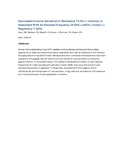| dc.contributor.author | Card, CM | |
| dc.contributor.author | McLaren, PJ | |
| dc.contributor.author | Wachihi, C | |
| dc.contributor.author | Kimani, J | |
| dc.contributor.author | Plummer, FA | |
| dc.contributor.author | Fowke, K R. | |
| dc.date.accessioned | 2013-06-28T13:24:56Z | |
| dc.date.available | 2013-06-28T13:24:56Z | |
| dc.date.issued | 2009-05 | |
| dc.identifier.citation | J Infect Dis. 2009 May 1;199(9):1318-22. doi: 10.1086/597801 | en |
| dc.identifier.uri | http://hinari-gw.who.int/whalecomwww.ncbi.nlm.nih.gov/whalecom0/pubmed/19301980 | |
| dc.identifier.uri | http://erepository.uonbi.ac.ke:8080/xmlui/handle/123456789/41837 | |
| dc.description.abstract | Human immunodeficiency virus (HIV)-resistant commercial sex workers provide a unique opportunity to study correlates of protection associated with natural resistance to HIV infection. Emerging data from studies of these individuals and other uninfected individuals who have been exposed to HIV suggest that low levels of immune activation may contribute to protection against infection. In the present study, HIV-resistant individuals were shown to have reduced frequencies of T cells expressing the activation marker CD69. They were also found to have elevated frequencies of regulatory T (T(reg)) cells, compared with HIV-negative control individuals. By controlling levels of T cell activation, T(reg) cells may contribute to HIV resistance by minimizing the pool of cells susceptible to infection. | en |
| dc.language.iso | en | en |
| dc.publisher | University of Nairobi | en |
| dc.title | Decreased Immune Activation In Resistance To Hiv-1 Infection Is Associated With An Elevated Frequency Of Cd4(+)cd25(+)foxp3(+) Regulatory T Cells. | en |
| dc.type | Article | en |
| local.publisher | Department of Medical Microbiology | en |

